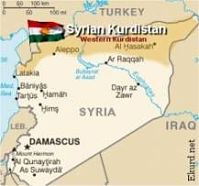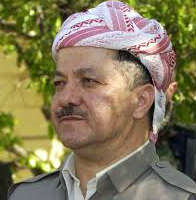Welcome To Roj Bash Kurdistan


Top Kurdistan Universities and Schools
Re: University & schools in S.Kurdistan
Wow nice university. With the same amount of money, they can build a stadium just like WEMBLEY STADIUM.
-

brendar - Shaswar

- Posts: 2073
- Joined: Sun Oct 30, 2011 8:28 pm
- Highscores: 0
- Arcade winning challenges: 0
- Has thanked: 948 times
- Been thanked: 1382 times
Re: University & schools in S.Kurdistan
Indeed, but i prefer this over a stadium. I think they should build universities like this all over Kurdistan.
-

diako_ber - Shermin

- Posts: 395
- Joined: Sat Apr 16, 2011 8:22 pm
- Highscores: 0
- Arcade winning challenges: 0
- Has thanked: 240 times
- Been thanked: 232 times
- Nationality: Kurd
Re: University & schools in S.Kurdistan
brendar wrote:Wow nice university. With the same amount of money, they can build a stadium just like WEMBLEY STADIUM.
We don't need stadiums in Kurdistan. Well, not as much as we need hospitals and universities.
The barbaric Arabs have kept our Kurdish land underdeveloped and we have to build up our own country first.
What they should do, is build a Sports City in Slemani. Not in Hewler, but in Slemani, since it is the cultural capital of Kurdistan.
It should include a big soccer stadiums, a smaller soccer stadiums, swimming pools (many, different ones), sport schools (recruiting, teaching), tennis stadium, stadiums for general sports (athletics etc.), bowling halls, pooling halls, etc. etc.
Just one enormous area, also with hotels etc.
-

crazyhorse - Ashna

- Posts: 439
- Joined: Mon Apr 16, 2012 8:05 pm
- Highscores: 0
- Arcade winning challenges: 0
- Has thanked: 107 times
- Been thanked: 203 times
University of Duhok, a symbol of Kurdistan's resilience

Celebrating its 20th year, the university plays a vital role in developing the Kurdistan region of Iraq
The University of Duhok (UoD) is a fast-growing institution which plays a vital role in promoting socioeconomic, cultural, scientific and educational progress in Kurdistan.
UoD was founded on the 31st of October 1992, following a resolution by the Parliament of the Kurdistan Region to address the increasing demand for higher education in the region. The first colleges to be established in the university were the College of Medicine and the College of Agriculture.
During the first two years, the two embargos imposed by the UN on Iraq and by the Iraqi Central Government on Kurdistan contributed to the slow paced growth of the university and the poor economic conditions in Kurdistan.
After these hardships had passed, the university found itself in a position to steer towards advancement and new growth.
By 2010 the UoD had 17 colleges and a Higher Institute of Planning. After applying a reform in the Kurdistan Region in 2010, the structure of the UoD has changed to a faculty system. Today, the UoD has nine faculties with 18 schools, more than 11,000 undergraduate students and 660 graduate students.
“Here, at the University of Duhok, we offer a wide spectrum of subjects to study through our many faculties and departments,” says University President, Dr. Luqman Dosky.
“We are proud of our ever growing teaching staff from all over the world. We are fortunate to have strong relations with local businessmen and the Kurdistan government,” he adds.
New partnerships, whether local relationships or links to universities abroad, are high on UoD’s agenda.
Vice President of International Relations at the University, Dawood S. Atrushi, believes that when it comes to international relations, UoD is the most successful university in Kurdistan. “We have implemented many good projects almost perfectly. America always says the University of Dohuk is at the top of the list when it comes to cooperation and implementing projects,” he says.
Over the coming years, Mr. Atrushi says UoD will work hard on quality assurance in education.
“We also hope that in the next five years hundreds of our students who are abroad will come back to Kurdistan with a new education, way of thinking, and culture,” he says.
“The challenge here is how to help our older, traditional professors who are educated in Iraq, who have not been abroad. We now have a project where we are sending 37 of our professors to the U.K. for 10 weeks, just to expose them to this environment. The challenges are there, and I also hope we can get on track towards accreditation,” he concludes.
http://www.krg.org
…………………………………………………………
KERKUK is the Heart of Kurdistan
Kurdish state is on the horizon with WK now freed great kurdistan is closing in.
KERKUK is the Heart of Kurdistan
Kurdish state is on the horizon with WK now freed great kurdistan is closing in.
-

alan131210 - Shaswar

- Posts: 9079
- Images: 2
- Joined: Fri Oct 08, 2010 12:23 am
- Location: Kurdistan
- Highscores: 0
- Arcade winning challenges: 0
- Has thanked: 4837 times
- Been thanked: 4389 times
- Nationality: Kurd
Kurdistan Universities
Does anyone know if there are any universities with finance masters in Kurdistan I looked at university of Dohuk and Hewler and they both don't have them. Also, would I benifit more if I got my masters in Canada do you think or in Kurdistan, keep in mind I one day want to work in Kurdistan.
Admin Edit :
there is a topic in kurdistan mega threads, your topic was moved there.
please search if the topic exists before making a new topic, this is a pre-warning .
Admin Edit :
there is a topic in kurdistan mega threads, your topic was moved there.
please search if the topic exists before making a new topic, this is a pre-warning .
-

purearch72 - Ashna

- Posts: 482
- Joined: Fri Sep 21, 2012 3:07 am
- Highscores: 2
- Arcade winning challenges: 0
- Has thanked: 43 times
- Been thanked: 116 times
- Nationality: Kurd
Re: Kurdistan Universities
SORRY I do not have an answer and might confuse you even more 
Many people choose to do their masters in England because of the excellent reputation our top universities have
But many of the English universities do not have excellent reputations in all fields. What I am trying to say is be very VERY careful which university you attend
One thing that you should consider if taking your Masters in America, is the possibility of future disagreement between Kurdistan and America - if there was conflict between the 2 countries then your Masters that you will have worked so hard to achieve might not be welcome
My suggestion to you would be to do further research in Europe and attend a European university
I wish you every success and hope you let us all know how you are getting on

Many people choose to do their masters in England because of the excellent reputation our top universities have
But many of the English universities do not have excellent reputations in all fields. What I am trying to say is be very VERY careful which university you attend

One thing that you should consider if taking your Masters in America, is the possibility of future disagreement between Kurdistan and America - if there was conflict between the 2 countries then your Masters that you will have worked so hard to achieve might not be welcome

My suggestion to you would be to do further research in Europe and attend a European university

I wish you every success and hope you let us all know how you are getting on

Good Thoughts Good Words Good Deeds
-

Anthea - Shaswar

- Donator

- Posts: 29478
- Images: 1155
- Joined: Thu Oct 18, 2012 2:13 pm
- Location: Sitting in front of computer
- Highscores: 3
- Arcade winning challenges: 6
- Has thanked: 6019 times
- Been thanked: 729 times
- Nationality: Kurd by heart
Return to Mega Threads (Top-100 Kurdish Topics)
Who is online
Registered users: Bing [Bot], Google [Bot]
















